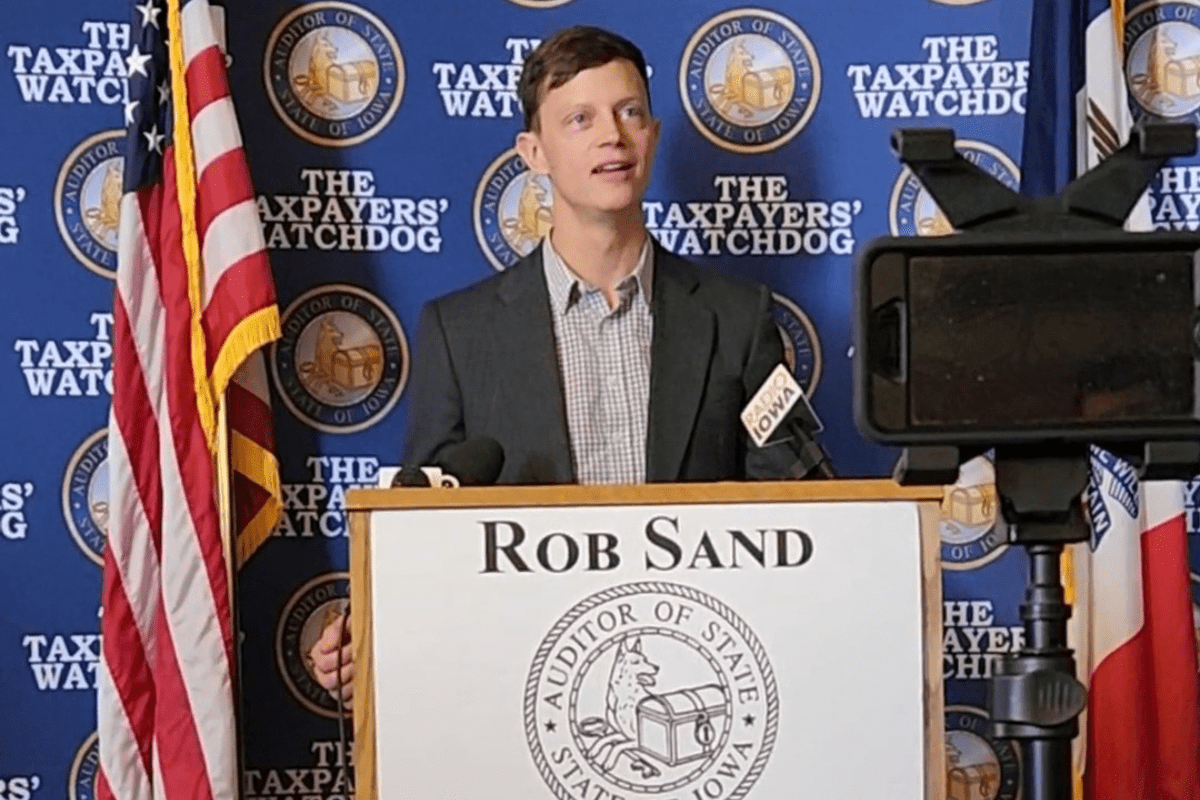
Rob Sand at a February press conference
Iowa State Auditor Rob Sand doesn’t want Iowa to be like Illinois when it comes to anti-corruption work, and he doesn’t think anyone else should want that either.
At a Thursday press conference, Sand went into detail about his opposition to a proposed bill—Senate File 2311, authored by Republican State Sen. Mike Bousselot of Ankeny—which would allow state agencies to hire a private certified public accountant (CPA) for their annual audits, rather than use the state auditor’s office, as is currently required.
The results of the audit would still be submitted to Sand’s office, but he warned the chance for corruption would increase.
“[Republican legislators] are so desperate to explain away the obvious purpose of this new legislation that they held up Illinois as an example for government accountability,” Sand said. “Illinois, where four of the last ten governors have gone to prison. Illinois, where even a study funded by the state of Illinois universities found that they were second in the country for public corruption.”
In a subcommittee meeting on Wednesday, Bousselot pointed out Illinois allows private CPAs to conduct audits of state agencies, prompting Sand’s Thursday response.
Sand, the only Democrat elected to a statewide office in Iowa, has not been shy about his belief that Iowa Republicans have targeted his office in recent years for partisan political reasons.
“The purpose of SF 2311 is not to create a better system for taxpayers, it’s to undermine an independently elected official of the state of Iowa and all of the people who work in this office for taxpayers,” Sand continued.
Sand said New Mexico is the only state that uses a similar department-by-department audit system and many states have chosen to move away from it, so he wouldn’t have many examples to use for how to create annual reports.
Bouseelot has said the law would make the timeline for audits faster and allow state departments to act more like local governments, which are allowed to hire private CPAs to conduct audits.
Sand said that was a disingenuous argument because those local audits still have oversight. His office can double check the documents and work and determine whether the audit is good. Under the new bill, his office wouldn’t be able to do that, or open special investigations, for state department audits.
“We typically issue two dozen special investigations a year,” he said. “Special investigations at their heart are being issued because an audit didn’t pick something up.”
“[The private CPA] would conduct that audit, and that audit would then—we could review it in the sense that we could read it, but that would be it,” he said.
Sand also pointed out that private auditors charge more than his office does, so this bill would cost taxpayers about $5 million.
“One of the most fundamental aspects of auditing is independence, and when you take the entity that’s being audited and put them in charge of the auditor, put them in charge of the auditor in terms of what they can look at—like they did last year or like this bill—you are undermining independence,” Sand said. “What is the purpose of an audit if you don’t have independence?”
Last year the state passed a law, SF 478, also written by Bousselot, that allows entities being audited to refuse to turn over documents to staff with the state auditor’s office.
Instead, the new system requires that representatives from Sand’s office, the entity being audited, and one chosen by Gov. Kim Reynolds meet to decide if a certain record should be turned over in an audit. A majority vote between those three ultimately decides.
Sand shared a story of how that law has worked out with an audit of the Iowa Board of Parole amid allegations they’ve broken state law.
A whistleblower told his office the board wasn’t following state law, and Sand’s auditors looked into it. But they were denied documents to verify the board’s claim that they had solved the issue on their own.
“In their reasoning, they cited SF 478, the new bill from last year,” Sand said. “Is it applicable here? Don’t think so. But they have the capacity to cite it and they wouldn’t provide us the documentation.”
“So can we tell you that the board will fix this problem on their own? We can’t,” he continued. “Can we tell you they fixed the problem at all? We can’t. No one in the state knows, other than a bunch of government insiders, because of the bill that this building passed and the governor signed last year.”
Support Our Cause
Thank you for taking the time to read our work. Before you go, we hope you'll consider supporting our values-driven journalism, which has always strived to make clear what's really at stake for Iowans and our future.
Since day one, our goal here at Iowa Starting Line has always been to empower people across the state with fact-based news and information. We believe that when people are armed with knowledge about what's happening in their local, state, and federal governments—including who is working on their behalf and who is actively trying to block efforts aimed at improving the daily lives of Iowan families—they will be inspired to become civically engaged.


Iowa pumps brakes on crypto ATM transaction fees
A new law caps daily crypto ATM transactions at $1,000, limits fees to 15% of the transaction amount, and requires operators to provide full refunds...

Iowa Legislature passes budget bill, adjourns with no property tax cut
Lawmakers worked through the night Wednesday to reach a budget deal after a contentious session went into overtime. While most of us were sleeping,...

Opinion: Zach Nunn is my congressman. I had to travel to DC just to talk to him.
I recently traveled to Washington, D.C. with a group of Iowans to talk with my representative: Congressman Zach Nunn. We weren’t sightseeing. We...

Op-ed: Iowa School Chaplain Bill is a Christian Nationalist Knock Off
The School Chaplain bill is currently rushing through the Iowa legislature – it’s now heading to the Iowa Senate floor as H.F. 884, having passed...

Iowa House Democrats propose worker relief package amid Iowa economic headwinds
Iowa House Democrats unveiled a series of legislative proposals aimed at supporting working families as the state faces economic headwinds,...

Iowa Republicans rush anti-apprenticeship, anti-union contracting bill, raising safety concerns
In 24 hours, Republicans in both chambers passed a bill that takes away an Iowa city’s ability to prefer contracts with established training...





